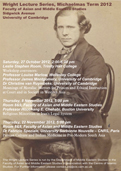Arab identity in the Making: The 'Unique Necklace' in Umayyad Andalusia
Duration: 46 mins 34 secs
Share this media item:
Embed this media item:
Embed this media item:
About this item

| Description: | Wright Lecture given on 14th February, 2013 by Dr Isabel Toral-Niehoff, Marie Curie Senior Research Fellow, Aga Khan University in London, Institute for the Study of Muslim Civilizations |
|---|
| Created: | 2013-02-18 16:12 |
|---|---|
| Collection: | Wright Lectures |
| Publisher: | University of Cambridge |
| Copyright: | University of Cambridge |
| Language: | eng (English) |
| Distribution: |
World
|
| Keywords: | Arabic; Culture; Literature; History; |
| Explicit content: | No |
| Aspect Ratio: | 4:3 |
| Screencast: | No |
| Bumper: | UCS Default |
| Trailer: | UCS Default |
| Abstract: | Though located in the far West, distant from the epicentres of Arabo- Islamic culture and the living environment of the Bedouins, we can observe in Andalusia a striking obsession with topics related to the so-called jāhiliyya (pre-Islamic Arabia) and to the Bedouin milieu (pre-Islamic poetry, genealogy, Arab grammar and lexicography, tribal lore or ayyām al-'arab), whereas hadīth science and usūl al-fiqh, e.g., remained rather unpopular in the first centuries of the Islamic dominion. This phenomenon of Andalusian 'Arabism' ('arabismo') has been explained by referring to the problematic political and Islamic legitimacy of the ruling Umayyad dynasty in Cordoba; other theories point to a phenomenon of 'nostalgia.' I will argue that it also reflects a concern with cultural identity issues, which is typical for the dynamics of cultural frontier regions, where these debates were especially virulent.
The textual basis shall be the 'Unique Necklace' (al-'Iqd al-Farīd, the most famous and popular Andalusian adab-work and can be considered as an all-encompassing "encyclopaedia" of Arab culture. It is rather completely drawn from Oriental material, but rearranged and reorganized in a way that seemed to have pleased the Eastern readers, since it was very successfully "reimported". Thus, paradoxically, a Western work dedicated to "Arabness" became a reference for the Arabs in the East. Dr. Toral-Niehoff, studied History and Arabic Studies in Tübingen (PhD 1997), "Habilitation" 2008 (Free University Berlin). Her main publishing and research fields are: Arabia and the Near East in Late Antiquity; cultural identities and multiculturalism; cultural transfer processes; Arabic Occult Sciences; Al-Andalus. Since 2012 she is Marie-Curie fellow at the Institute for the Study of Muslim Cultures at the Aga Khan University in London. She brings to her work immense linguistic ability, as a native speaker of Spanish and German with fluency in Classical Arabic, Modern Standard Arabic, English, French, Italian, Modern Greek, Classical Greek, and Latin, and basic knowledge of Persian, Turkish, and Syriac. |
|---|---|
Available Formats
| Format | Quality | Bitrate | Size | |||
|---|---|---|---|---|---|---|
| MPEG-4 Video | 480x360 | 1.73 Mbits/sec | 606.17 MB | View | Download | |
| WebM | 480x360 | 259.75 kbits/sec | 88.63 MB | View | Download | |
| iPod Video | 480x360 | 520.52 kbits/sec | 177.53 MB | View | Download | |
| MP3 | 44100 Hz | 249.79 kbits/sec | 85.29 MB | Listen | Download | |
| Auto * | (Allows browser to choose a format it supports) | |||||

